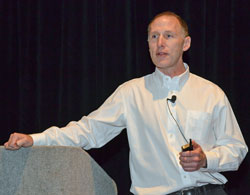 One of the talks at the Boehringer Ingelheim Vetmedica 4th PRRS ARC&E Seminar at the International PRRS Symposium was dubbed “Unreasonable Expectations,” given by Dr. Eric Neuman, originally from Illinois, but now a veterinary epidemiologist with Massey University in New Zealand. Part of the “unreasonable expectation” in PRRS eradication could be thinking the disease can be solved easily. The problem is, the last lingering cases of the swine diseases seem to keep it going. Neuman calls it an anti-Pareto Effect, referencing the Pareto principle that says taking care of 20 percent of causes, solves 80 percent of the problems, the low-hanging fruit researchers look for. But in disease eradication, especially with PRRS, it’s flipped around.
One of the talks at the Boehringer Ingelheim Vetmedica 4th PRRS ARC&E Seminar at the International PRRS Symposium was dubbed “Unreasonable Expectations,” given by Dr. Eric Neuman, originally from Illinois, but now a veterinary epidemiologist with Massey University in New Zealand. Part of the “unreasonable expectation” in PRRS eradication could be thinking the disease can be solved easily. The problem is, the last lingering cases of the swine diseases seem to keep it going. Neuman calls it an anti-Pareto Effect, referencing the Pareto principle that says taking care of 20 percent of causes, solves 80 percent of the problems, the low-hanging fruit researchers look for. But in disease eradication, especially with PRRS, it’s flipped around.
“We can get rid of 99 percent of the cases, [but] it’s the last 1 percent [that can’t be solved] that make the difference,” Neuman says. In addition, he said there’s plenty of surveillance information about PRRS… maybe to the point of information overload. “We don’t need more information… I just need the right information.”
Neuman added that he likes where the industry is at this moment, but he’s worried there’s not enough diverse thinking contributing to a wider spectrum of answers. He said we know how to take PRRS out of a single farm, but we don’t know how to eliminate it on a larger scale. Neuman hopes that meetings like this one will foster more creative thinking.
Listen to Chuck’s interview with Dr. Neuman here: Interview with Dr. Eric Neuman
